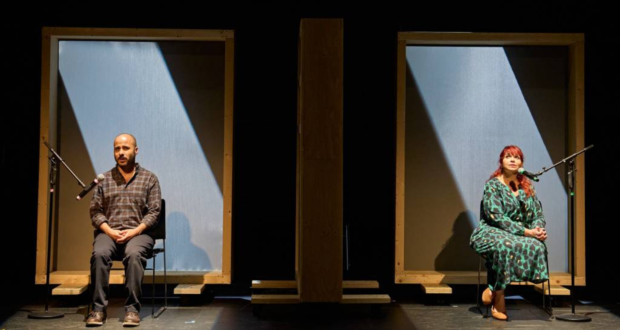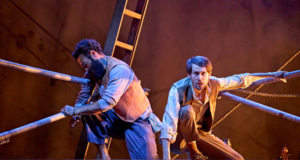With Jewish identity under attack, this play gives voice to those who feel threatened. Verbatim accounts of prejudicial behaviour battle against a range of racist slurs and stereotypes, with consequences explored in a thought-provoking manner.Summary
Rating
Good
A packed house at the Royal Court was treated to a dose of reality with this theatrical platform used as a sounding board for those of Jewish faith and culture who feel marginalised and rebuked by society. Treading these boards actors use the verbatim words from intervieww with a range of people about their thoughts on antisemitism in our society.
It’s an engrossing initial idea by Tracy-Ann Oberman, further shaped and developed by Jonathan Freedland. The production presents a range of contrasting voices; doctors, politicians, social workers, activist, even a painter and decorator. Their harrowing tales of prejudice are compelling, sometimes incredible, always dispiriting and definitely sad. Sad, not just for the hurtful blatant racism endured but also the casual way we all buy into long standing prejudices – even those who may think their consciousness are well and truly clear.
Freedland has shaped the material around some key prejudices as seen by the Jewish community; money, blood, and power. As each topic lights up on the wall the group reconvene to express their thoughts and share their fears and stories about the need to resist the typical stereotypical identity.
This verbatim style of theatre allows for personal and often gripping evidence of the racism suffered. However, as all are singing from the same hymn sheet there is no on-stage conflict. Without such conflict the actors instead directly address the audience to convince or to challenge, reducing any sense of drama.
Moving screens designed by Georgia de Grey show text message, headlines, tweets and news feeds, giving the piece an immediacy. Vicky Featherstone’s direction is inventive with speakers moving like pieces on a chess board, moving forward and back and even sideways in confusion and distress. To give a further theatrical backdrop to the narrations there are simple dumb shows and masques, indicating the historical prevalence of antisemitism.
Our attention is grabbed immediately with an amusing opening where God thunderously seems to unleash Hershal Fink upon the world (a fictional character for which the Royal Court lately apologised for their stereotypical presentation of a mean billionaire) – it’s a fun opening that pokes fun at itself. Credit to the Royal Court for being spirited enough to take one on the chin!
Of course, mention of the Fink incident goes to the heart of these personal revelation. Many feel let down not only by friends and colleagues but by institutions, media, university, and political parties. In places they sought comfort and solidarity they often find themselves ignored, criticised, berated or indeed threatened – particularly via social media. What comes over from all the dialogue is just how destructive pervading prejudicial notions are of any ethnic group. Just because you may be a left of centre individual doesn’t mean you are blameless. Look at the Royal Court with its liberal standing, yet even they overlooked the stereotype of the money-grabbing Jew – until called out.
Jews. In Their Own Words is very much a company piece, but special mention must go to Steve Furst for capturing the great and the good with ease and a touching sense of reality. Equally, Debbie Chazen gives justice to the words of Margaret Hodge, capturing the hurt and disappointment of slander and jibes from the very heart of her political family.
This is an evening where theatre informs and persuades. It gives voice to a minority group who feel their identity is continuously under threat, due to the rehashing of Jewish tropes, mythologies, and imaginings. We and our institutions should put a stop to the racism now and appreciate the diverse and creative differences on offer and release them from stereotypical portrayals, both historical and the present day – and this production is a starting point that calls out to us all for action.
Written by Jonathan Freedland, from an idea by Tracy-Ann Oberman
Co-created by Vicky Featherstone, Tracy-Ann Oberman & Audrey Sheffield.
Directed by Vicky Featherstone
Jews. In Their Own Words. plays at Royal Court Theatre until 22 October. Further information and bookings can be found here.
 Everything Theatre Reviews, interviews and news for theatre lovers, London and beyond
Everything Theatre Reviews, interviews and news for theatre lovers, London and beyond




One comment
Pingback: Review: Jews. In Their Own Words, Royal Court Theatre – Everything Theatre – Social Care News and Features